The Effects of Noise Pollution on Hearing and Mental Health

The world around us is filled with sound, some of it pleasant and some of it not so much. While noise pollution is an unavoidable part of modern life, its effects on our physical and mental health are often overlooked. Chronic exposure to high levels of noise pollution can also lead to stress, anxiety, and other psychological factors that can indirectly contribute to erectile dysfunction for which men may need to take medicines like Cenforce D and Super Vidalista.
What is noise pollution?
Noise pollution is defined as any sound that is loud, unpleasant, or unwanted, and that hurts human health or well-being. Examples of noise pollution include traffic noise, airplane noise, industrial noise, and construction noise.
Effects on Hearing
Noise pollution can have a significant impact on hearing, particularly when it is sustained over a long period of time. Exposure to loud noise can cause hearing loss and tinnitus (a ringing or buzzing sound in the ears) in both children and adults. The extent of hearing damage depends on the volume of the noise and the duration of exposure. Even brief exposure to very loud noise, such as a gunshot or explosion, can cause permanent hearing loss.
Effects on Mental Health
Noise pollution can have a huge impact on mental health. It has been linked to increased stress levels, anxiety, and depression. Studies have shown that people who live in noisy environments are more likely to experience sleep disturbances, which can lead to a range of physical and mental health problems. Chronic noise exposure can also lead to cognitive decline and impaired learning ability, particularly in children.
Strategies for Minimizing the Effects of Noise Pollution
While it is impossible to eliminate noise pollution from our lives, there are steps we can take to minimize its effects on our health and well-being. Here are some strategies for reducing exposure to noise pollution:
Use earplugs or noise-canceling headphones: If you are exposed to loud noise regularly, such as at work or while commuting, consider using earplugs or noise-canceling headphones to protect your hearing.
Soundproof your home: If you live in a noisy area, soundproofing your home can help reduce the amount of noise that enters your living space. This can be done through the use of sound-absorbing materials, such as acoustic panels or carpets.
Choose quiet appliances: When purchasing appliances such as air conditioners, fans, or refrigerators, look for models that are designed to operate quietly.
Plant trees and shrubs: Trees and shrubs can act as natural sound barriers, reducing the amount of noise that enters your property.
Advocate for change: If you are concerned about noise pollution in your community, consider advocating for change. This could involve working with local authorities to reduce noise levels from traffic or construction, or supporting initiatives to promote quiet zones in residential areas.
Noise pollution is a pervasive problem in modern society, with significant impacts on both physical and mental health including sexual problems. Moreover, noise pollution can also interfere with communication and intimacy, which can harm sexual relationships and overall sexual satisfaction.
That is why men exposed to too much noise pollution are forced to take medicines like Tadarise 20mg and Vilitra 20mg. While it may be impossible to eliminate noise pollution from our lives, there are steps we can take to minimize its effects. By protecting our hearing, soundproofing our homes, choosing quiet appliances, planting trees and shrubs, and advocating for change, we can help create a quieter, healthier world for ourselves and future generations.






